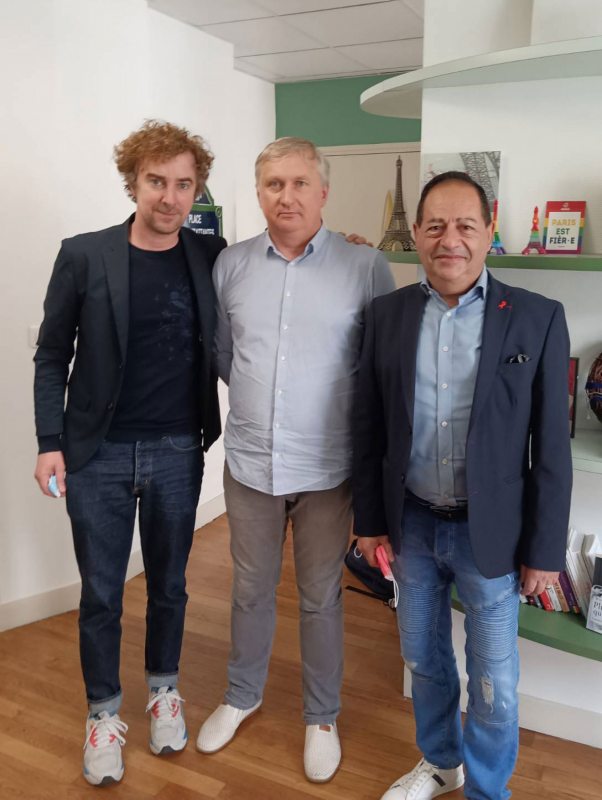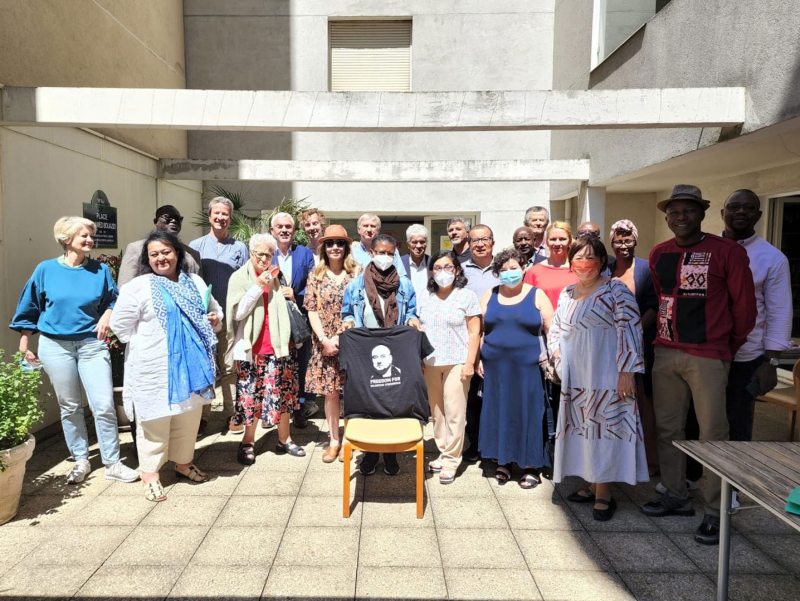Valiantsin Stefanovich re-nominated for the post of FIDH Vice-President
In early July, Pavel Sapelka, a lawyer with the Viasna Human Rights Center, attended a meeting of the International Bureau of the International Federation for Human Rights (FIDH) in Paris, where he presented Viasna's reports and met with Deputy-Mayor Jean-Luc Romero-Michel.

- FIDH International Advocacy Director Antoine Madelin, Viasna human rights defender Pavel Sapelka and Paris Deputy-Mayor Jean-Luc Romero-Michel
The meeting of the FIDH International Bureau discussed the work of the Federation, its future plans, and prospects. Human rights defender Pavel Sapelka spoke about the human rights situation in Belarus after the presidential election in 2020, the criminal case against the Viasna members, and the detention conditions of Viasna Deputy Chairman and FIDH Vice-President Valiantsin Stefanovich; former FIDH Vice-President and Viasna Chairman Ales Bialiatski; lawyer and coordinator of the Human Rights Defenders for Free Elections campaign Uladzimir Labkovich; health condition of the coordinator of Viasna’s volunteer network Marfa Rabkova; head of Viasna Homieĺ branch Leanid Sudalenka; and volunteers Tatsiana Lasitsa and Andrei Chapiuk. All seven human rights defenders have been detained for more than a year.
It became known that Valiantsin Stefanovich has been nominated for the post of Vice-president for the next term. His candidacy was supported by representatives of Armanshahr / OPEN ASIA, Civil Society Institute (Armenia), Asociación Pro Derechos Humanos (APRODEH) from Peru, Ditshwanelo - the Botswana Center for Human Rights, Finnish League For Human Rights, Ligue des Droits Humains (Belgium), Human Rights Movement "Bir Duino" (Kyrgyzstan). The FIDH Congress and elections to the International Council of FIDH will take place this fall.
Valiantsin Stefanovich was elected FIDH Vice-President for Europe and Central Asia for a three-year term in 2019, along with Artak Kirakosyan (Armenia) and Talekan Ismailova (Kyrgyzstan). Viasna Human Rights Center has been a member of the International Federation for Human Rights for 18 years.
During his visit to Paris, Pavel Sapelka presented three reports of Viasna, which analyze the situation in detention facilities in Belarus, the politically motivated criminal and administrative prosecution of citizens in 2021, and the first quarter of 2022.
According to the RFI, the human rights activist said that
“The torture section is the largest in the reports, reflecting the situation in Belarus.”
“Since the 2020 elections, 2,900 people in Belarus have been subjected to criminal prosecution. As of today, 1,234 people have been recognized as political prisoners, and counting,” stressed Pavel Sapelka.
It is virtually impossible to calculate the total number of prisoners in Belarus, he said. According to official data for 2018, there are 38,500 of them. But human rights activists believe added more than 7,000 people in so-called ‘Medical-Labour Centres'’ and in open-type correctional facilities, which are basically labor camps inherited from the Soviet penitentiary system, should be added to this number.
Sapelka also paid attention to the imprisoned lawyers, Maksim Znak, Aliaksandr Danilevich, Vital Brahinets, and others:
“Lawyers are bound by a non-disclosure agreement, which is interpreted as widely as possible. Violations can result in harsh prison sentences, so lawyers can't even tell their client's loved ones anything. And not only does the bar association not help its members, it performs practically a police function.”
Maryia Kalesnikava 's sister Tatsiana Khomich told about the prison conditions of Maryia Kalesnikava and other political prisoners at the presentation.


















